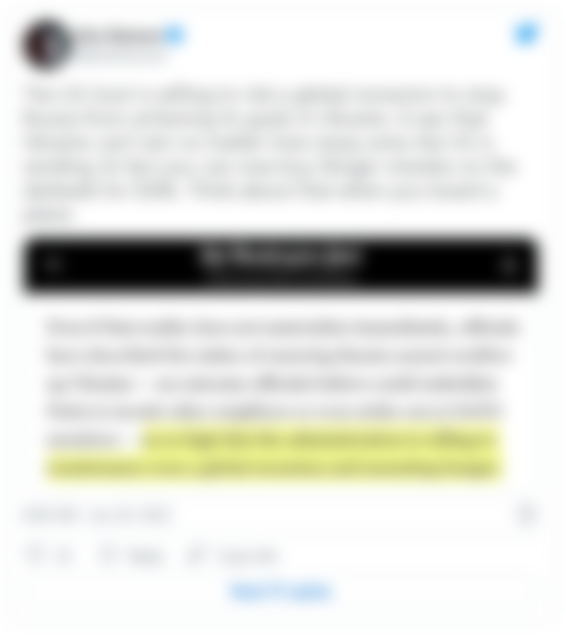Modern Economic Nonsense — An engineering recession
There is a difference between a recession and a slowdown. A recession is when the economy contracts for two straight quarters, not just one. A slowdown happens when the economy grows slower than usual. An engineering recession is when the central bank purposely slows down the economy to fight for issues such as inflation. It's not that economy has any problems caused by any factors but a political movement to sustain the economy through battle inflation caused by the ongoing war. And the further question is how long this can be sustainable until? It is a tricky question because it depends on how long the war can drag on and what outcome both sides of the country will accept.

https://twitter.com/KimDotcom/status/1538910644094701575
How does the central bank slow down the economy?
The central bank can slow down the economy by raising interest rates. When the economy is growing too quickly, the central bank will raise interest rates to slow down the pace of growth. Raising interest rates makes it more expensive for businesses to borrow money, making them less likely to expand. Conversely, when the economy is too slow, the central bank will cut interest rates to make it cheaper for businesses to borrow money. Making it more affordable for companies to borrow money makes them more likely to expand and hire more workers. The central bank can also buy government bonds from banks to make more cash available for businesses to borrow.
In this current market, the central bank forces the economy to slow down and fight against inflation. A purposely slowing down the economy causes the market to sell off and reduce debts. But fewer people are caring about where that money goes? Instead, they are pumping into the war zone. The war is costly and wasteful. It can bring down the country's economy. But is it fair to make the global recession because one government wants to expand its political goal into another?
Why is an engineering recession necessary?
There are various reasons why there's an engineering recession. These include government spending, business investment, and consumer spending. Additionally, the engineering recession may result from a trade war between the US and China. Government spending is declining due to the political climate in the US. Businesses are paring back on their capital spending because of the trade war and the overall business environment. Consumer spending is slowing down, especially on big-ticket purchases. Government spending is at the lowest level since the 1940s. The growth of the US economy has been at its lowest since the financial crisis. The development of the world economy is at its lowest since the financial crisis, with only a modest expansion rate.
The effects of an engineering recession
There are no positive impacts of an engineering recession. The economy of the country will go into a slowdown. The GDP of the country will go down, and unemployment will go up. As a result, the government's tax revenue will also go down. The government will have to spend more money on social security and other entitlement programs. All of this will put a lot of strain on the government's finances. The government will have to cut spending, which will hurt the businesses. The businesses will have to lay off workers, and the employees will be not able to make ends meet. Thus, the businesses and the government will be at the receiving end since there will be less money to spend. The construction companies will have to cut down on their spending. The oil and gas companies will also have to cut down on spending. This will affect the supply chain in the country. The supply chain will be broken due to the lack of spending. The engineering recession will also hurt the local business. And such engineering recession may go out of control if the central bank is not able to fully control it. When the recession comes, the central bank then has no choice but to lose the monetary policy by cutting the interest rate again, which companies will react on it. Such a mess will trigger people to wonder why we are doing the interest rate hike in the first place.
The end of the fiat currency domination era
The back and forth of hiking and dropping rates will lose people's confidence about the fiat current. As a result, it will further push dollar domination away and weaken the dollar. People will seek other currencies to replace the dollar when the trust deteriorates. That is why Bitcoin and other cryptocurrencies can help transition from dollar to digital currency. The central bank will have no choice but to issue CBDC to compete with cryptocurrencies and further weaker dollar power.
Conclusion
If a recession is on its way, that means the economy will slow down. When the economy is growing too slowly, it's often called a recession. This usually happens when there's less demand for goods or services. When a recession is expected, central banks can try to prevent it by taking action. One way to do this is by reducing the interest rate. By lowering the interest rate, the central bank hopes to make it more attractive for people to save money rather than spend it. This will cause the economy to slow down. The central bank can also buy government bonds from banks. This makes more cash available for businesses to borrow. The goal of these actions is to prevent a recession from happening. But either way, the central bank is in a dilemma that costs the trust of the fiat currency. The dollar domination era is ending from now on.
